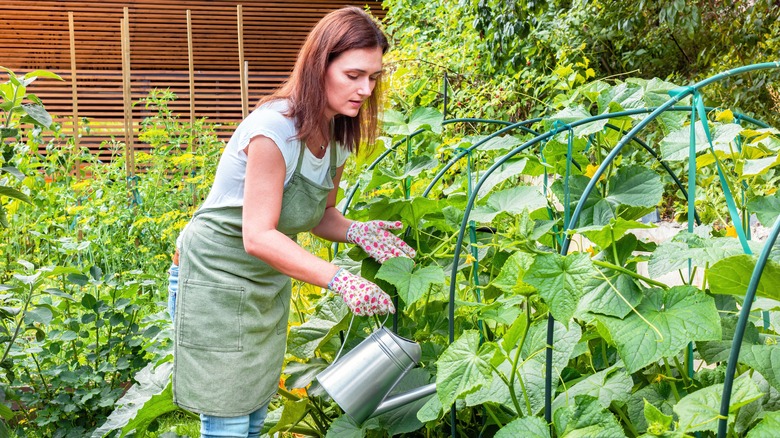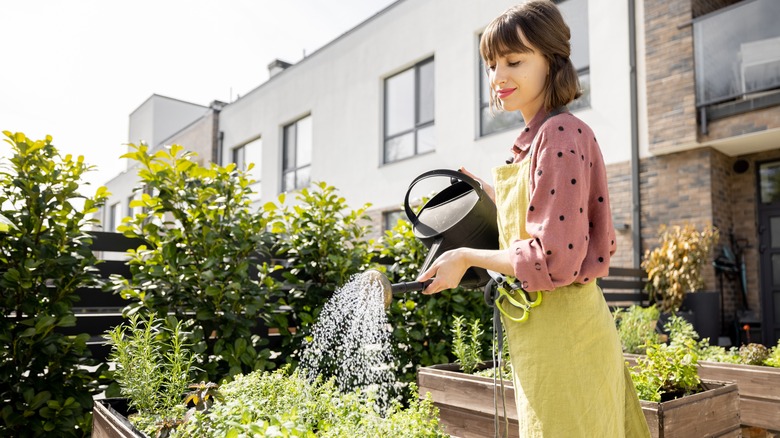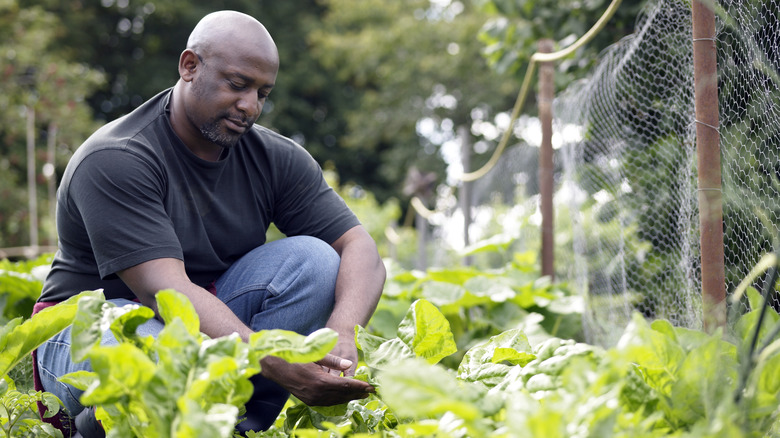The Best Time Of Day To Water Your Vegetable Garden
Watering your vegetable garden is a crucial task for ensuring a healthy and productive harvest of produce. But as summer progresses, the timing of when you water your garden becomes very important. You may have heard that watering your garden in the morning or at dusk is the best time. But morning watering is really best for keeping vegetable plants vibrant and resilient as they grow.
Vegetable plants have different rates of growth and this can often depend on the amount of sun, water, and nutrients they receive during their growing cycle. Rich, well-drained organic soil is also a necessary component for a healthy vegetable garden. Some plants need extra water at the beginning of their growing cycle, while others prefer more water closer to harvest. But the one constant guidepost for watering your vegetables is that it needs to be done consistently and frequently.
However, overwatering can also be detrimental, so it's important to know how much water is too much. Some vegetables (and fruits like tomatoes and melons, which you may also have in your veggie garden) have a high water content, so ample water is necessary for their growth cycle. Other vegetables may need less water. Watering your vegetable plants properly will help your vegetables get bigger, juicier, and tastier, and help them stay strong in periods of extreme summer heat or drought.
Why morning is best
Morning watering is best because this gives time for dew to evaporate off leaves before evening. The morning also means cooler temperatures during the hot days of summer. The common wisdom is that your garden should get about an inch of water per week, and it's best not to do this all in one day. Every other day should work fine unless there is heavy rainfall.
Morning watering is also a good idea during a heat wave because if your plants are starting to droop, the early dose of water will help them to tolerate the day's heat. If you can't water in the morning, try to water in the evening. It's best not to water during the middle of the day, as the water will evaporate more quickly. On a hot day, that midday combination of heat and moisture might cause your plants to droop even more. But if you absolutely have no other time to water, watering at midday is better than no water at all. Water at the roots of the plant to help prevent mildew or rot; this is especially true for tomatoes, squash, melons, and peppers.
Should I water twice in one day?
Let's say it's very hot outside, for days on end, with no rain in sight. Should you water your vegetable garden more than once a day? The simple answer is no. While it may be tempting to give your garden as much water as possible when the weather is so extreme, giving the soil around your plants time to dry out a bit between waterings helps keep them more resistant to mold, mildew, or other problems. Overwatering is almost as bad as not providing enough water.
There's a simple test to determine if your garden needs water. Grab a handful of soil. If it sticks together, there's definitely enough moisture present for the time being. If the soil crumbles easily and feels dry and dusty, watering is probably a good idea. This also might mean you should add some soil amendments to enrich your soil and make it more absorbent, which will improve drainage. Good drainage means your soil is not holding too much moisture, but also is not drying out too quickly, either.
Watering your vegetable seedlings, or watering veggies growing in containers, requires different watering strategies from watering larger plants in a traditional garden bed. Learn the different principles of watering for the kind of garden and plants you have, and soon enough you'll become confident in your ability to know just when, and how much, to water.


